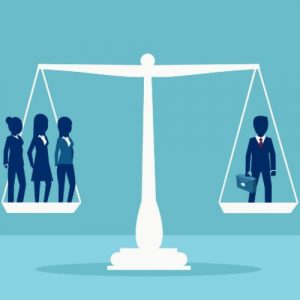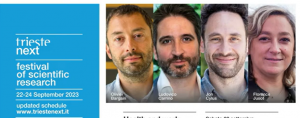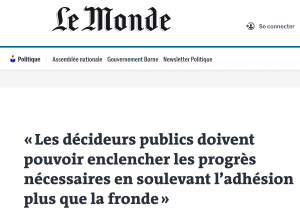Communication
Environment

Research Director at CNRS and WAP expert, Marc Fleurbaey takes part to a roundtable on green growth vs. de-growth. The debate on the consequences of climate change can give rise to polarized positions, one according to which the only way out is a form of degrowth involving a significant drop in the standard of living relative to contemporary standards, and at the other extreme a vision of the climate “transition”, often tinged with techno-optimism, as a new opportunity for growth and jobs. This roundtable aims to provide some points of reference in this debate.
–
Social justice & the Green new deal
Marc also discusses the Green liberal dilemma in Climate policy.
Gender
Women’s work and changing norms

Olivier Bargain, Professor at the Bordeaux School of Economics and Director of WAP, takes part to a webinar on the macroeconomic impact of reducing gender differences in labor market participation in Morocco (in French), providing the results of a recent expert analysis in partnership with UNU-WIDER and UN-Women.
Economic and social context of domestic violence
Michał Myck, WAP expert and Director of the Centre for Economic Analysis (CenEA, Szczecin), presents results from a new survey FROGGEE that allows measuring the social and economic contexts of domestic violence in Poland.
Health
Social inequalities in health

Trieste NEXT: public roundtable by WAP members and colleagues from Trieste and the World Health Organization on health and the future of work
–

Florence Jusot and Sandy Tubeuf, WAP experts and Professors at Dauphine University and the University of Louvain, providing complementary analyses regarding social inequality in health.
–
Rationalizing public health debates after the Covid crisis

Jérôme Wittwer, WAP expert and Professor at Bordeaux Population Health, takes stock of evidence and experience on the public health system and paths of reform following the pandemic crisis.
–
Labor market, poverty & inequality
Can Universal Income work?

Senior researcher at OECD and WAP expert, Herwig Immervoll, discusses the possibility of implementing a universal Basic Income showing results of recent simulations.
Difficulty to sustain lockdown in poor countries

WAP director, Olivier Bargain, speaks at the United Nation research institute (UNU-WIDER) in a webinar on poverty and work mobility in developing countries, showing how people in poor regions have difficulty complying with shelter-in-place policies.
Well-being
Measuring Well-Being and Lives Worth Living COVID-19

Marc Fleurbaey, WAP expert and CNRS Research Professor, presents research on the measurement of well-being when individuals have heterogeneous preferences, including different conceptions of a life worth living.
For more reliance on social & behavioral sciences for policy making

A recent op-ed by Olivier Bargain and colleagues calling on public authorities to take better account of individual and collective behavior by mobilising more social and behavioral scientists in the design of public policies



